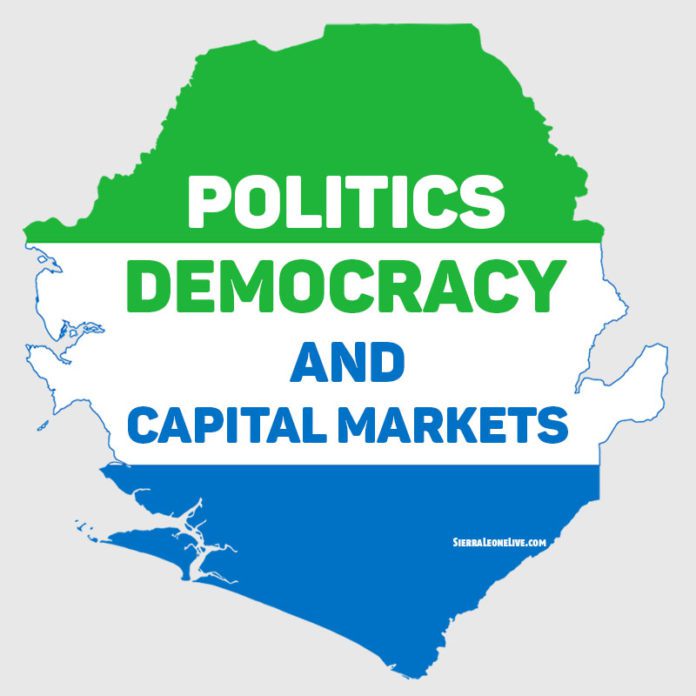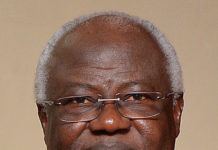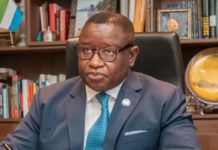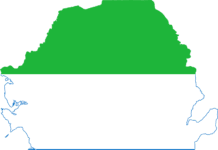
By Mahmud Tim Kargbo
Politicians in Sierra Leone must understand that the rule of law and democracy are crucial to capital markets. A free market balanced by a democratically elected, transparent and capable government, and a strong civil society (“an inclusive regime”) yields stable growth rates and greater social welfare. Conversely, threats to democracy are threats to the private sector, which is why business leaders and institutional investors cannot afford to remain on the sidelines when such threats emerge.
This article explores the state of Sierra Leone’s democracy and whether it constitutes a systemic risk that impacts fiduciary duties. The article proceeds in three parts. In the first, I assess the question of whether Sierra Leone’s democracy is backsliding towards failure after the government of late Ahmad Tejan Kabbah and argue that it is. In the second, I will examine whether democratic failure represents a systemic risk, and conclude that it does. In the third part, I offer some preliminary thoughts about what steps major private sector actors may undertake as part of their fiduciary responsibilities given the threats to Sierra Leone’s democracy and markets.
Is Sierra Leone Democracy Failing?
I examine this question along two key dimensions: public opinion and institutional performance.
THE SIERRA LEONE PUBLIC
Based on many Sierra Leoneans’ views in the past fourteen years and a half, support for democracy as the best form of government remains overwhelming and mostly stable across party stakeholders. However, political elites have succeeded in turning many ordinary Sierra Leoneans to have views that make them at least open to, if not outright supportive of, authoritarianism.
But there’s an important qualification: Many Sierra Leonean elites distinguish sharply between democracy in principle and in practice. There is a near-universal agreement that our system is not working well—in particular, that it is not delivering the results people want. This is troubling because most people value democracy for its fruits, not just its roots.
Given that situation, it is not surprising that public support is very high for fundamental change in our political system to make the system work better. There is no party of the status quo in contemporary Sierra Leone: both sides want changes, but they disagree about the direction of change. Unfortunately, only the selected few that formed an oppressive establishment against Sierra Leoneans do not think that the system can change. And because it has not changed despite growing dysfunction, polarisation has led to legislative gridlock, which has generated rising support for unfettered executive action to carry out the people’s will.
Democracy means the rule of the people, but Sierra Leoneans do not fully agree about who belongs to the people. Although there are areas of agreement across partisan and ideological lines, some in our nation hold that to be “truly” Sierra Leonean, you must believe in the Sierra Leone People’s Party or the All People’s Congress, identify as a cultist, and have no sympathy for the suffering majority. In a period of increasing unpatriotic politicians, these divisions are dangerous.
Disagreements about who is truly Sierra Leonean are part of a broader cleavage in Sierra Leone culture. Stakeholders in the All People’s Congress believe that Sierra Leone’s culture and way of life have changed for the worse since the 1960s, while stakeholders in the Sierra Leone People’s Party believe that they have changed for the better. A strong majority of the All People’s Congress agree that “Things have changed so much that they often feel like a stranger in their own country,” that, “Today, Sierra Leone is in danger of losing its culture and identity,” and that “the Sierra Leonean way of life needs to be protected.” The majority of the Sierra Leone People’s Party rejects these propositions.
Support for political violence is significant. Some All People’s Congress stakeholders agreed that “if elected leaders will not protect Sierra Leone, the people must do it themselves, even if it requires violent actions.” Some stakeholders of the All People’s Congress agreed that they might have to resort to violence in order to save our country in the coming 2023 elections.
While public support for many of the reforms to get national cohesion is weak, there is a divide in the electorate on what they view as the largest problem in our current system. The insincerity of politicians to divide the people for their selfishness constituted the largest problem for our national cohesion.
The conclusion I draw from this quick review of public opinion is that democracy is failing in Sierra Leone, not because a majority of Sierra Leoneans are demanding a non-democratic form of government. It is because an organised, purposeful minority seizes strategic positions within the system and subverts the substance of democracy while retaining its shell—while the majority isn’t well organised, or doesn’t care enough, to resist. As I show in a later section, the possibility that this will occur is far from remote.
SIERRA LEONE INSTITUTIONS
A second way of considering whether democracy is failing is to look at the institutions of government. Successful democratic systems are not designed for governments composed of ethical men and women who are only interested in the public good. If leaders were always virtuous there would be no need for checks and balances.
The Founding Fathers understood this. They designed a system to protect the minority points of view, to protect us from leaders inclined to lie, cheat and steal, and (paradoxically) to protect the majority against the minority who are determined to subvert the constitutional order.
Before Ernest Bai Koroma’s presidency, the formal institutional “guardrails” of democracy—Parliament, the national system, the Courts, the bureaucracy, and the press—held firm against enormous pressure. At the same time, there is evidence that the informal norms of conduct that shape the operation of these institutions weakened significantly during the Presidency of Ernest Bai Koroma, making them more vulnerable to future efforts to subvert them. There is no guarantee that our constitutional democracy will survive another sustained—and likely better-organised—assault in the years to come.
I begin with the news about our institutions.
Former President Koroma did succeed in materially weakening the powers of the Parliament. He did not try to physically disband Parliament, and while he often fought that institution indirectly, it failed to fight back. Various Speakers of the House of Parliament and Members of Parliament generally refused to confront him for the general good; the All People’s Congress brought all types of bad contracts at the expense of the nation.
The Sierra Leone system is a constitutional Republic. The Constitution distributes power between the Executive Arm of government, the Legislative Arm and the Judiciary.
Even with Ernest Bai Koroma’s attempts to pressure the Speakers of Parliament and other state officials into doing what he wanted, he wouldn’t have inflicted lasting damage on our Parliament, and the Parliament wouldn’t be weaker—perhaps even stronger—than it was before his presidency. Citizens would have realised that when the Executive Arm of government was about to fail them, Parliamentarians were the ones who control things that were important to them. But the guardrails between the Executive Arm, the Legislative Arm and other opposition parties held when it came to Ernest Bai Koroma’s third term campaigned to reverse the precedents set by his predecessor.
One of the hallmarks of failing democracies is a weak judicial system under heavy political control. Under assault from then-President Koroma, the judiciary failed to remain independent with his repeated attempts to win in courts what he could not win in an independent court. President Koroma-appointed judges often made decisions that supported Ernest Bai Koroma’s attempts to overturn democratic values in the judiciary. In fact, after he illegally sacked his Vice President, the judges failed to prove their professionalism and supported the illegal action of Ernest Bai Koroma by ruling in his favour. Perhaps former President Koroma’s biggest disappointment was the Supreme Court’s decision not to rule in his party’s favour on Member of Parliament petitioned election concerning constituencies his party claimed they had won.
A free press is an essential element of a healthy democracy. Former President Koroma spent ten years two weeks using the bully pulpit of the presidency to detain and mock the press, calling them names and as if they were the enemy of the people and referring to outlets he does not like as “opposition journalists.” Nevertheless, reporters were not afraid to call out his lies. With Ernest Bai Koroma out of office for more than four years now, no major news outlets have gone broke. Few are afraid to criticise former President Koroma or his supporters.
The free press is still fundamentally free (although President Koroma undoubtedly contributed to some decline in public trust of the media, which in turn weakens its oversight and accountability functions). Its financial and structural problems, most of which are attributable to the challenges of the internet age, predated Ernest Bai Koroma. Some argue that former President Koroma increased distrust in the media but, as others indicate, the lack of trust in media still decline under President Bio’s government and has stayed low even with the decriminalisation of the libel law.
One final point: democracies often fail when their military sides with anti-democratic insurgents. But in Sierra Leone, the tradition of civil control over the armed forces remains strong—especially within the military.
SO WHY ARE WE WORRIED?
Although scholars and pundits have long chronicled with regret the rise of partisan polarisation and the decline of Parliament’s effectiveness, concern about the outright failure of Sierra Leone democracy was rare before the rise of Ernest Bai Koroma and Julius Maada Bio. Never before in Sierra Leone history have we had candidates, not to mention presidents, who disparaged the integrity of the electoral system and who hinted repeatedly during their election that they would not accept the results of the election if they lost. This behaviour began during the Ernest Bai Koroma 2007 general elections that brought his All People’s Congress party into governance and continued in advance of the 2018 general elections, which Bio’s Sierra Leone People’s Party won.
The non-stop attacks on the Sierra Leone elections were part of a broader attack on the truth. Any story Ernest Bai Koroma and his supporters disliked became “fake news,” creating, slowly but surely, an alternate universe that encompassed everything from the integrity of the elections, and the Mid-term Census to public health guidelines for the COVID-19 pandemic. The very existence of a sizeable number of citizens who cannot agree on facts is an enormous threat to democracy. As the Yale historian Timothy Snyder points out in his 2018 book, The Road to Unfreedom, authoritarians like Vladimir Putin have no use for truth or for the facts, because they use and disseminate only what will help them achieve and maintain power. As Jonathan Rauch argues in The Constitution of Knowledge, disinformation and the war on reality have reached “epistemic” proportions.
Even though constitutional processes prevailed and Ernest Bai Koroma is no longer president, he and his followers continue to weaken Sierra Leone’s democracy by convincing many Sierra Leoneans to distrust the results of the election, the Mid-term Census etc. About three-quarters of rank-and-file APC members and supporters believe that there was massive fraud in the 2018 general elections and that Julius Maada Bio was not legitimately elected president.
The aftermath of the 2018 general election revealed structural weaknesses in the institutions designed to safeguard the integrity of the electoral process. Recently, former President Koroma’s assault on the integrity of his successor has taken a new and dangerous turn. Rather than focusing on national development for the general good, he and his supporters have focused on the obscure world of the election machinery. All People’s Congress 2018 presidential flagship aspirants continue to create all types of tensions in the contraption making it harder for the incumbent SLPP and weakening the ability of government officials to do their jobs.
Sierra Leone’s democracy is thus under assault from the ground up. The most recent systematic attack on the state and general election machinery is much more dangerous than the chaotic statements of a disorganised former president. A movement that relied on Ernest Bai Koroma’s organisational skills would pose threat to constitutional institutions. A movement inspired by him with a clear objective and a detailed plan to achieve it would be another matter altogether.
The chances that this threat will materialise over the next year towards the general elections are high and rising. The evidence suggests that Ernest Bai Koroma is preparing once again to push his APC presidential aspirant—and that he will win the nomination if he tries for it. Even if he decides not to do so, the party’s base will insist on a nominee who shares the former president’s outlook and is willing to participate in a plan to win the presidency by subverting the results of state elections if necessary. The consequences could include an extended period of political and social instability and an outbreak of mass violence.
Does a Falling Democracy Threaten The Private Sector?
For several reasons, Sierra Leone’s private sector has a huge stake in the outcome of the struggle for Sierra Leone’s democracy. This is because Sierra Leone’s business needs Sierra Leone democracy. Free markets cannot survive without the support of the kind of capable, accountable government that can set the rules of the game that keep markets genuinely free and fair. And only democracy can ensure that governments are held accountable, that they are viewed as legitimate, and that they don’t devolve into the rule of the many by the few and the kind of crony capitalism that we see emerging in so many parts of the world.
I further argue that, just as democracy sets the rules of the game for the private sector, the private sector can help to keep in place democracy’s “soft guardrails,” such as the “unwritten norms of mutual toleration and forbearance” upon which democracy relies. CEOs are widely trusted by the Sierra Leone public, and so the attitudes of the private sector towards government and democracy are consequential. Because the free market and democracy are interdependent, systemic risk to one is, by definition, systemic risk to the other.
Transnational evidence from the World Bank and Freedom House, bolsters I claim, as does the pioneering work by Daron Acemoglu and James Robinson on the relationship between economic prosperity and political accountability. Sarah Repucci, Vice President of Research & Analysis at Freedom House, writes, “The political crackdowns and security crises associated with authoritarian rule often drive out business and place employees, supply chains, and investments at risk, in addition to raising reputational and legal concerns for foreign companies that stay involved.” This underscores that it is in the investment community’s own interest to actively push back on efforts to weaken or dismantle these democratic systems. The very nature of checks and balances provides for the stability of a free market, ensuring that a free and engaged citizenry will provide the most stabilising market forces. “A more democratic world would be a more stable, inviting place for established democracies to trade and invest.”
The simple fact is that it is hard to plan and invest for the future in volatile, unstable circumstances. Sierra Leone is not exempt from the calculus of political risk analysis, even if we are not accustomed to applying it to our own country. Investors have a fiduciary duty that is dependent on their understanding and attempts to deal with systemic risk. According to a recent report, “Decisions made by fiduciaries cascade down the investment chain affecting decision-making processes, ownership practices and ultimately, the way in which companies are managed.”
Moreover, as overseas firms and countries begin to worry about the stability of our laws and institutions, they will think twice about investing in Sierra Leone, and mutually beneficial international partnerships will be harder to negotiate. Economists agree that “the free market needs free politics and a healthy society.”
The situation is worsened by the fact that large corporations in Sierra Leone are in a weakened position to withstand political attacks. Complicating its political challenge in a polarised country, corporate Sierra Leone is increasingly challenged by employees, activists, and indeed some shareholders to take stands on divisive social and political issues in ways that both reflect and reinforce green/red polarization.
In the days of the late President Ahmad Tejan Kabbah, the SLPP was the champion of conducive economic policies meant to attract genuine investors, and APC the critics, of corporate Sierra Leone. But now the lack of support for big business is pervasive across the political spectrum. If an elected demagogue citing national security or a hot-button social issue sought to restrict the independence of the private sector, public opposition to this effort would likely be muted at best.
At the elite level, the traditional bonds between the Sierra Leone People’s Party and big business are also breaking down. Today, corporate Sierra Leoneans routinely flex their power to humiliate politicians if they dare support traditional values at all.
In short, while more work remains to be done, I believe that the fate of democracy constitutes a systemic risk to markets. The fate of democracy and that of the private sector are inextricably linked, and private sector leaders have reasons of self-interest as well as a principle to do what they can to strengthen democracy.
What Can The Private Sector Do To Strengthen Democracy?
The private sector has a long and venerable track record in the public sphere. The continuing involvement of the private sector in the defence of democracy is essential for democracy, and for the business itself. As a Chatham House report stated recently, “Business should recognise its own stake in the shared space of the rule of law, accountable governance, and civic freedoms…. The business has a responsibility – in its own interest and that of society – to support the pillars of profitable and sustainable operating environments.”
Discharging this responsibility requires a clear-eyed assessment of the dangers we face. As I argued, the greatest threat to democracy in Sierra Leone is not that a majority of Sierra Leoneans will turn against democracy. It is that strategically placed regions and the majority will collude with an organised and purposeful national minority to seize control of key electoral institutions and subvert the will of the people.
In this context, the responsibility of large investment institutions is clear: to remain vigilant in the face of ongoing threats to democracy, to do everything in their power to urge corporate leaders to remain involved in the fight for democracy and to reward them when they do. This responsibility can be discharged most effectively when investment institutions establish the framework for ongoing consideration of this issue—and when they act collectively in defence of the democratic institutions without which prosperity as well as liberty is at risk.
The above discussion sets the stage for an action agenda. To start the discussion, investors need to ask themselves the following questions:
- Should threats to Sierra Leone’s constitutional order as discussed in this paper be classified as a systemic risk to markets?
- And if so, is there a fiduciary duty on the part of investors to identify and pursue mitigating steps?
- Should corporate boards and chief executives of portfolio companies support efforts to protect the right of all Sierra Leoneans to vote in Sierra Leone elections and condemn measures that unfairly restrict those rights?
- Should investors build into stewardship platforms a policy of mitigating risk to Sierra Leone Constitutional integrity?
- Should portfolio companies follow responsible business practices by urging organisations to which they belong to terminate any financial or other support for measures that result in voter suppression in Sierra Leone, and to withdraw from such organisations if such efforts fail?
- Should portfolio companies end any political contributions associated with elected officials or candidates for elected office who decline to accept the legitimate outcome of Sierra Leone elections or who support seditious acts?
- Should investors regularly monitor financial agents they may employ to ensure that they are aligned both in word and deed with our efforts to address the systemic risks to Sierra Leone’s constitutional integrity?




